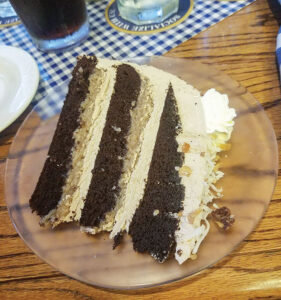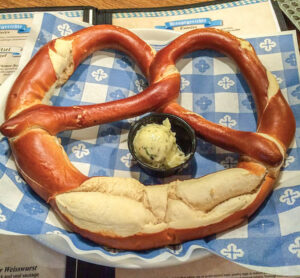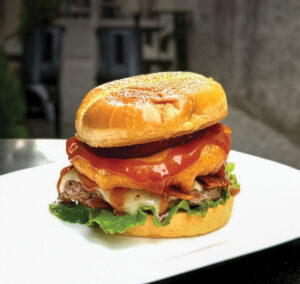The two-lane highways leading to Gibson City bisect some of Illinois’ most productive corn and soybean acreage.
The Ford County town’s gigantic grain elevators are visible from just about anywhere, including from the middle of its wide downtown streets. It’s not uncommon to see semi-tractor trailers brimming with beans passing through.
That’s why visitors are stunned the first time they visit the Bayern Stube, an authentic German restaurant in the middle of town.
“When people walk in the door, they don’t expect what’s inside. It’s a whole experience,” says Jeanne Schnabel. “People are shocked. They just cannot believe what they are seeing.”
Home of the Schnabels
Diners are literally walking into the “Bavarian living room” – the bayern stube – of Schnabel and her husband Guenter. First, they encounter the cozy and inviting bar, a room that’s wrapped in wood paneling, dark Alpine-style dining furniture and every other space stuffed with antiques, hunting trophies and beer steins.
The waitresses wear the traditional Bavarian drindl and the menu is laced with a smattering of translated German terms.
“We wanted to create a comfortable, cozy environment. Some people call it kitschy, but it was important to us that they see all the steins and animal trophies. Many of those items are my mother’s collections. It’s all part of it,” Schnabel says.

Now in business for 27 years, the restaurant was opened in 1991 by Schabel’s parents – Peter and Erika. They had moved in 1981 with their children, Pete and Jeanne, from Berlin, Germany to Champaign, about 30 minutes southeast of Gibson City.
Inspired to create a dining experience reminiscent of their homeland, Peter and Erika perfected family recipes, honed the menu and tapped other local suppliers with their own European specialties. For example, the sausages are made by Stiglmeier Sausage Co. in Wheeling and the breads are prepared by The Bread Co., a Swiss bakery in nearby Urbana.
Those hunting trophies – the jagerstube – are no accident. Schnabel’s grandfather, Dietrich, was a game warden in the Taunus Forest near Frankfurt, Germany. The restaurant’s banquet room is named in his honor.
Schnabel and her husband bought the business from her parents in 2005, carrying on a family tradition for hospitality and good food.
Speaking of the food …
Guten Appetit

Without hesitation, Schnabel said the most popular dish is the Schweinebraten, slices of roasted pork loin smothered with demi-glace, and is followed by the schnitzels with their choices of sauces to top the lightly breaded and pan-fried cutlets.
“I think for many people the Schweinebraten is safe since most people know pork roast,” Schnabel explained.
The schnitzel is a different story. “A lot of people think it’s a hot dog because of Wiener schnitzel,” she said.
Over the years, the Schnabels have perfected the menu to include food descriptors complimenting the German names. They also traded some of the less popular German entries for such “Americanized” items as chicken and steak but served with s the haystack onions.
Other entries include a whole string of sausages – Bavarian bratwurst, Thüringer bratwurst, Weisswurst, smoky links, Swiss Cheese Knacker and Hungarian bratwurst.
There are even more schnitzel choices. There’s Rahmschnitzel (sautéed pork cutlets topped with a creamy white wine and mushroom sauce), Schnitzel a la Holstein (topped with a fried egg in honor of Diplomat Friedrich von Holstein), Schnitzel Ludwig (with sautéed mushrooms, onions and shredded Swiss cheese) and Schnitzel Dietrich (with portabella mushrooms and Gorgonzola cheese), Schnitzel Oskar (with green asparagus, crabmeat and sauce Béarnaise), Bismarck Schnitzel (with roasted apples and shredded Swiss cheese), and Jäger Schnitzel (with mushroom sauce).
And some of those schnitzels are available as pork or veal cutlets.
Appearing on the menu as “The Original Wiener Schnitzel,” a simple preparation calls only for fresh lemon or, upon request, with capers and anchovies.
There are plenty of other entrees besides the schnitzel – Schweinekoteletts Wilhelmina (pan-seared pork chops with mushrooms, Swiss cheese and demi-glace), Kassler Rippchen (grilled and smoked center cut pork loin), and all kinds of combination plates.
It would not be German without the red cabbage, sauerkraut, potato pancakes, spaetzle, German potato salad, plate-sized pretzels, pickled herring or goulash soup.
Certainly, Schnabel and her husband are discerning connoisseurs of German cuisine and they have discovered a few other German eateries across the nation that they enjoy. But as Schnabel put it, “We have traveled the world and lived in Europe. Our palate is pretty wide.”
While they have a fondness for Thai and Chinese when they dine out, she’s hopeful that they too have captured loyal German diners.
“Some people say our food is transformative for them. We try to deliver authentic with our food.”
Correction: The website for last month’s restaurant, Firefly Grill, should have been www.ffgrill.com. We apologize for any confusion.









